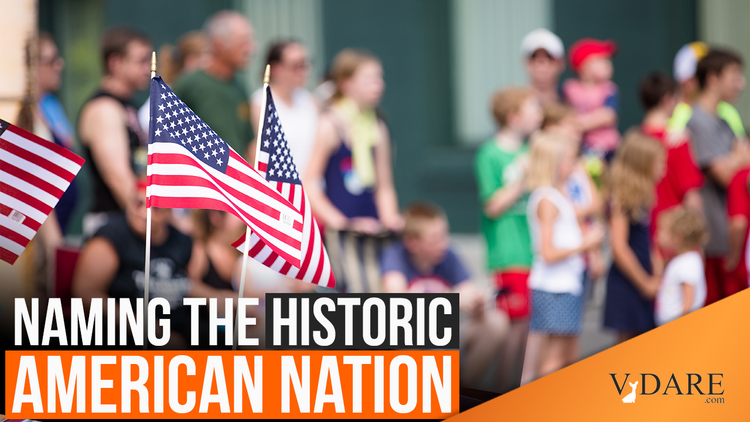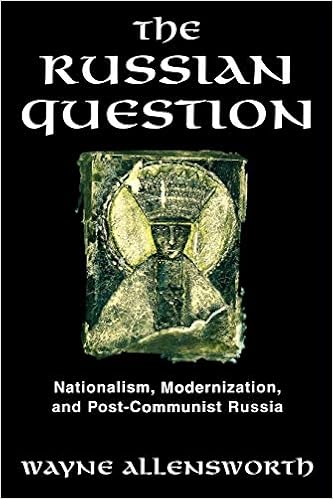
To Combat Dispossession, Middle America Must Find A New Name
08/25/2020

I’ve spent the best part of four decades studying Russia and things Russian. And I’ve always regretted that, unlike the Russians and many other nations, Americans don’t use words like “fatherland” or “motherland” to describe their country. The closest we have is “homeland.” When used by Americans, that word, like most of the language we use to describe ourselves and our country, has a civic, political, even a technical quality to it. It lacks the aura, the sense of a mystic connection to the place of one’s birth, that a word like the Russian “rodina,” motherland, has.
It may be that the Anglos themselves, the British people who founded this country, were so inclined to stress legal forms (and legalism) that the loss of “blood and soil” terms, or the blanching of words like “homeland,” was inevitable. Those words fell out of use or lost some of their character and texture. When we speak of “our forefathers,” we usually mean the men who signed the Declaration of Independence and wrote the American Constitution, not necessarily a broader group of foundational leaders bound by blood ties as well as by ideas about republican government rooted in Anglo-British culture.
Our “forefathers” were narrowed in the popular narrative to a select group of constitutional “framers” or “founders,” and we lost sight of something those men were well aware of: The notions of liberty and law that they so eloquently proclaimed were the products of a particular people, place, and culture. It was an identity that they took for granted.
The American core, then, is Anglo. That founding core went on to assimilate, sometimes with some difficulty, waves of other Europeans. “Americanization” was the program whereby other Europeans were forced to conform to an Anglo-Protestant foundational culture. The founding stock plus those that assimilated became the American people — what VDARE.com calls “The Historic American Nation” — the core that defines the nation in the political and cultural sense.
Many of us experience a sense of attachment, of loyalty, and patriotism that is normal for most people. But American civic nationalism glossed over questions of blood ties, and the founders’ references to “ourselves and our posterity” were forgotten.
The Limits Of Assimilation, Mass Culture, And The Failure Of Civic Nationalism
As time passed, and the concepts of Anglo liberty and republican constitutional government were abstracted, disconnected from their very specific roots, we lost sight of the fact that our political antecedents were themselves peculiar, specific, and organic. And that meant they were not universally applicable.
Assimilation could only work within certain boundaries — the closer the immigrants were to the host country’s core, the more readily they could be melded with that core. Pre-1965 America had probably reached the outer limits of what was possible for a core ethnic group’s assimilation of large numbers of immigrants.
In the 20th century, mass culture, technology, and easy mobility were accompanied by economist, egalitarian ideologies that supported those phenomena. The cultural homogenization of mass society diminished the once strong sense of place, belonging, and identity that was a characteristic of both America in the broad sense, and the America we knew in our day-to-day lives as Texans, Hoosiers, Hawkeyes, Arkies, Buckeyes, or Tar Heels.
Those days are, I’m afraid, a long time gone.
History, egalitarian ideology, and technology shaped our civic view of nationalism, which was viable only so long as the core population, what Russians would call “the state forming people,” were a strong, confident super majority. That is obviously no longer the case.
The War On Middle America: What’s In A Name?
America’s foundational people are presently experiencing a bizarre, macabre nightmare of America bashing, icon-smashing, and the embrace by what I’ve called the globalist Blob of a mad hatter, topsy-turvy view of reality.
As the core population is relentlessly attacked, it’s also become clear that we lack the language to express ourselves as a particular people. And without the words, it is difficult to reproduce the thing itself, the drive to be ourselves, to defend ourselves, and to define who and who is not one of us.
The Left is quite correct to have concentrated on words, on language itself, in hampering the possibility of our people defending themselves.
In contrast, as a consequence of its imperial past, Russians can differentiate the “state forming people,” the Russkiy narod, the ethnic Russian core, from Russian citizens, Rossiyane. All things specifically associated with ethnic Russians are Russkiy, while the term Rossiyskiy has a broader political and cultural connotation.
We lack such precise terminology, to the detriment of our ability to defend ourselves. That which must be defended must be named. As noted above, the time when “American” was taken to mean primarily the George Washington-Betsy Ross-Daniel Boone prototype and those who assimilated to the country they made, is long gone. The term “American” is now largely equated with citizenship, undercutting core Americans’ sense of ethnic identity.
All ethnic identities have a racial foundation, but race is not the whole of ethnicity. Russians, for instance, are whites, but they are not Americans. Language, religion, shared history, and culture, right down to the clothes they wear, the foods they eat, and the stories they tell, all figure as integral parts of a people’s identity.
So what should we call ourselves?
“Core Americans” is one possibility. The term “foundational” has come into use as well in describing both black people with a long historical connection to America, as well as to the core American group. “Foundational Americans” is an accurate description of the core group.
I’ve used “Middle Americans” as a name for us, as it has been used before to describe those of us attached to the heartland. “MARS,” or “Middle American Radicals” was an early attempt at naming people who later became known as “deplorables,” and it is precisely those people who are attached to, and who wish to defend, America. A collection of Sam Francis’s essays was entitled Revolution from the Middle. Francis was the prophet of that revolution.
Nevertheless, as the assaults on “white privilege,” and “white supremacy” mount, we have to defend ethnic Americans, Middle Americans, as whites. And it is European civilization itself that is under assault both here and in Europe. Whatever we call ourselves, we have to be clear that it is that civilizational and cultural heritage and the people who are its carriers that is under assault. Part of defending Middle America will be countering “the flight from white.”
As your humble servant noted in a previous article:
The lack of a widely accepted word for core Americans leaves them largely defenseless to the cultural Marxist onslaught — or has forced them to capitulate to the ideological premises of their enemies, and descend into self-loathing. “White” has been seized by the left as a hate term…This is why core America tends to defend itself only feebly by clinging to constitutionalist procedural and political language, Reaganite “free market conservatism,” and thanking the troops for their service. These are all statements of a patriotism they take to be clear of racial overtones, but are, as our enemies recognize, implicitly expressions of core American identity. This latent sense of identity was also evident in core Americans supporting George W. Bush, and then voting for Donald Trump eight years later. These same people tend to idolize Ronald Reagan. A large number of them have probably never grasped the policy contradictions that at least superficially separate these men — their votes for them were not so much expressions of explicit policy support as they were largely unconscious expressions of identity. Thus, to the cultural Marxists, Trump’s civic nationalism built around the concept of “Make America Great Again” is also supposedly racist, and a black conservative like Candace Owens is herself cast as a tool of “white supremacy,” as she expresses her viewpoints in core American political language.
It’s Not OK to be White, Chronicles, February 2020
We cannot cede any cultural ground to our enemies, who will not be satisfied with anything less than our complete capitulation and the subversion, if not extirpation, of all our institutions, which are inescapably part of our ethnic heritage.
Don’t Know Much About History
One problem with naming that which has been deprived of a legitimate name is the widespread historical amnesia that is particularly prevalent among young people. American history did not begin in 1965, or with the election of Barack Obama, or the canonization of George Floyd. Defending our real history and reviving knowledge of our proud past is a good place to start [Don’t Know Much About History, by Tom Piatak, Chronicles, August, 2020].
As evident in the success of companies like Ancestry.com, there is a widespread thirst for seeking out one’s roots, for a “thick” cultural heritage that is more rooted than mass culture and preferences in consumer products and sports franchises.
We should recall that “education” began as the training of children to be loyal and useful members of their community. It was a means of affirming their identity and transmitting a heritage long before it became a mere means of utilitarian vocational and professional training. That grounding in the folk tales and religious rituals of the community helped perpetuate Comanches, and Russians, and Zulus, and Japanese as distinct peoples.
Middle Americans, shocked by the anti-American, anti-white, anti-Christian revolution now underway, are now being forced to choose sides, to decide who are they are. As the estimable James Kirkpatrick has noted,
[T]he question of ‘who is or is not an American’ is being answered for us in the streets, as statues of Union and Confederate leaders, the Founders, heroic presidents like Teddy Roosevelt, and other symbols of the American identity are destroyed and defiled.
That presents an opportunity and a trial for the rest of us who are already conscious of our identity and take pride in it. An instinctual revulsion to the wanton destruction Kirkpatrick described is but the beginning.
The summer of our national life is over, but our people live on. They remain without a proper name, but, as the resistance to the revolution underway mounts, they are still alive.
Whatever we call ourselves, we will carry on — but not without spirit, not without heart.

Wayne Allensworth is a Corresponding Editor of Chronicles magazine. He is the author of The Russian Question: Nationalism, Modernization, and Post-Communist Russia, and a novel, Field of Blood. He writes at American Remnant (https://american-
